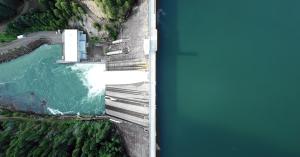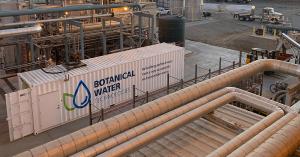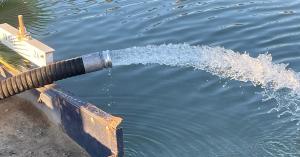
Impacting the world with clean drinking water and blue transparency
Enhancing transparency and trust for impact projects by using blockchain technology and internationally recognized environmental frameworks.
LONDON, UNITED KINGDOM, November 28, 2022 /EINPresswire.com/ -- Companies are investing billions of dollars to minimize exposure to their water risk, improve operational efficiency, and balance water use. Like financial reporting, stakeholders, shareholders, regulators, communities, and governments require accuracy and transparency for invested funds, returns, and benefits of environmental and social projects.The EU, applying the Corporate Sustainability Reporting Directive (CSRD), and the US, via the Securities and Exchange Commission (SEC), recently announced new disclosure requirements on how companies operate and manage social and environmental challenges. Requirements for non-financial, environmental information will only become more stringent over time.
Leading companies in the food and beverage, technology, data center, apparel manufacturing, and energy sectors are implementing water efficient processes and investing in projects that replenish, or balance, high water risk basins where their water is extracted.
“… the general idea is that a volume of water consumed by a company is ‘balanced’ through interventions in watersheds and communities outside the plant walls. As projects are implemented, they provide quantitative water benefits by restoring, treating, or saving a certain volume of water, and ultimately contribute to a time-bound target,” World Wildlife Fund.
The Volumetric Water Benefit Accounting (VWBA) empowers companies with a standardized, and science-based methodology to calculate the water quantity benefits of replenishment activities.
“To be effective and avoid accusations of ‘greenwashing,’ balance goals must have a defensible means of accurately defining and quantifying key performance indicators and advancing public policy objectives and collective actions,” said Wendy Larson, Senior Principal, LimnoTech
To assist corporates in achieving these goals, Botanical Water Technologies (BWT) uses their patented Water Harvesting Units (WHUs) that capture and purify evaporative concentrate from food processors to create a new sustainable water source. Individual processor sites can generate ~100-500M Gallons (~400 – 2000 liters) of harvested water per season, and multiple processor sites within one basin can be targeted to obtain replenishment scale.
This harvested water can be used for environmental replenishment projects and to provide safe drinking water to disadvantaged or water-scarce communities. Harvested water is traced via blockchain technology from the farm gate to the processor to the ultimate final use. The VWBA method is used to quantify project benefits.
"Many large companies use the Volumetric Water Benefit Accounting approach to provide external stakeholders transparency of the benefit of their water projects. BWT uses VWBA and other globally trusted, independent, and recognized, frameworks and standards and its own blockchain technology to provide full transparency of the volume and impact of water harvested" James Rees, Chief Impact Officer, Botanical Water Technologies.
During August this year, BWT partnered with the Ingomar Packing Company, in Los Banos, California, to capture and purify evaporative condensate. A portion of this harvested water was reused in the Ingomar facility, reducing the need of municipal or basin water, and a proportion was allocated to six local communities who will receive a reduction in their Ground Water Protection targets.
BWT used VWBA to quantify the volumetric benefit of the project. 2022 was the first year of operations at Ingomar and the volume of water provided will substantially increase and it will be a long-term sustainable asset for the San Joaquin California region.
BWT are expanding operational sites in the United States, Mexico and India in 2023.
Botanical Water Technologies PR Team
Botanical Water Technologies
email us here
EIN Presswire does not exercise editorial control over third-party content provided, uploaded, published, or distributed by users of EIN Presswire. We are a distributor, not a publisher, of 3rd party content. Such content may contain the views, opinions, statements, offers, and other material of the respective users, suppliers, participants, or authors.




